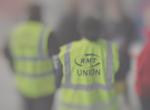Here is London Underground's reply to the letter that your Regional Organiser sent to him objecting to the company deducting staff's pay or leave on the day of heavy snow ...
Impact of Adverse Weather on 2 February 2009
I am writing in response to continuing demands for further discussion of LU's approach at a recent Stations Functional Council meeting.
LU has always maintained, and I have previously explained, our approach must acknowledge and appreciate the efforts made by the thousands of our staff who struggled to get into work that day, and through their efforts ensured we were able to run a reasonable service throughout most of the day. We must not undermine these efforts and I am sure you recognise the importance of this as employers in your own right.
Leaving aside staff who had previously pre-booked extended leave, and those already known to be absent through sickness, we now know that 573 staff in Operations had a single days absence on 2 February out of a resource of over 9,000 (not including former Metronet).
Of those 573: 12 were absent for defined reasons (hospital appointment, court appearance, parental leave, removal leave, dependents leave); 442 chose to take annual leave for the day; 58 chose to take unpaid special leave; and 57 were granted special paid leave. 4 individuals have been marked absent without pay.
These figures fully support the approach adopted by LU in that it is now clear: the vast majority of staff attended for duty; managers have not penalised lateness; managers have been flexible in granting annual leave to those not able to attend; all bar 4 individuals have resolved their circumstances with their employing manager in accordance with the guidance; discretion has been applied as individual circumstances have become clear; AAW triggers have not kicked in for that day.
It is simply impossible to provide a blanket approach that satisfactorily covers all eventualities. The guidance required managers to exercise common sense in the event of excephonal circumstances that prevented individuals from being able to attend and this has happened, but at a headline level it is very difficult to differentiate. It is always the employee's duty to attend for work and it is a matter for them how they get to work. Transport failures and delays on this scale are thankfully rare but this does not remove the onus and responsibility placed on the individual and as we now know, the vast majority of staff managed to get into work despite the problems that day.
Nevertheless, our approach encouraged managers to be flexible; to accommodate lateness; to be receptive to exceptional circumstances; to consider alternatives; and above all to ensure staff not able to attend that day had the opportunity to be paid if that was their preference. The outcome is I believe fair and realistic.
In response to the RMTs request for me to deal with the collective grievance, I am more than content for there to be a review of individual circumstances should individuals believe their circumstances have not been dealt with in accordance with the guidance, and this is exactly what the grievance process enables. But LU will not accede to a general demand that we provide a 'free day' when the vast majority of staff demonstrated their desire and determination to get into work that day.
One note: RMT agrees with LUL that those staff who made it to work despite the snow should receive proper appreciation for their efforts. However, simply giving them their normal day's pay and taking pay/leave away from their workmates is no way to show appreciation. We suggest instead some form of reward such as a 'thanks to you' voucher.
- 2662 reads




